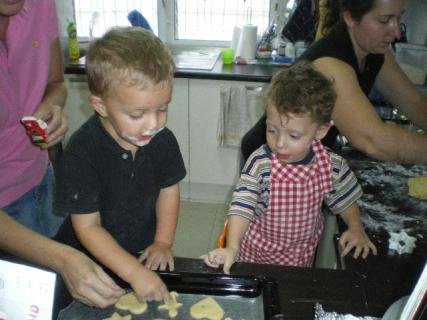This is just a brief presentation I’m giving tomorrow to the 8th grade students at my school called "Facebook & Privacy".
Year: 2010 (page 4 of 20)
I’m presenting to a 5th grade class this Friday on using PowerPoint as a presentation tool, most of whom will have never used PowerPoint. I’m going to start with a discussion of what a bad PowerPoint presentation looks like, using the model I’ve created below (which I have in video format). Later on in the year I’ll be presenting on a variety of different presentation tools. We are just starting with PowerPoint because it is on each of the computers in our mobile lab.
The next step, I’m going to give the students a few pointers, via laminated diagrams, on how to do a few basic things in PowerPoint. After that, the students will be given a PowerPoint scavenger hunt, basically a "Figure out how to make this slide" series of activities.
I see two flaws with this lesson plan so far so I have a couple of questions.
What can I do to extend this for students who finish early? How can I build more inquiry into this lesson?
One of the parents of a child I taught last year shared this with me. Here is what I think the math class should look like. Forget teaching kids computation, especially when a computer can do it faster, cheaper, and more reliably.
This classroom more closely resembles Dan Meyer’s math classroom where students are expected to formulate problems but taken to a further degree. Let’s do away with the repetitive tasks that a computer can easily do by hand, make sure all students have those devices that they need to do these repetitive tasks, and then focus on how to use the computations in the real world.
If a person can be arrested for making a claim on Twitter that they will "blow up an airport", how can it be okay in our society to incite hatred against a group of people? I saw the comment below on a story on Yahoo about the courageous kid, Graeme Taylor, who stood up for his teacher.

This kind of hatred is unacceptable in our society. It is unacceptable to me that we will prosecute and incarcerate someone for what is obviously a joke, but that we let millions of hate-filled comments about the #LGBTQ community pass. There is something wrong with a free speech law which will let hatred stand uncontested and unprosecuted.
We live in a messed up world and need to rethink our priorities.
The old paper form of a textbook is certain to die. I’m sure of it.
The new form of a "textbook" has a feature list that turns the textbook from something people read to something people experience. Note that this feature list isn’t fantasy, nearly all of these features already exist in some form.
Here are the features I think every textbook should have.
- The textbook should be 100% searchable. No more wondering where eukaryotic appears in the text. You’ll just be able to quickly type in a search term and find all of the places it appears.
- Key words in the text should be linked to explanations of these key terms. Click on the word, find out what it means in this context and what other resources exist to understand it.
- The readability of the text should be individually customizable. Want to challenge yourself and improve your vocabulary? There’s a setting for that. Feel like taking it easy on the reading? There’s a setting for that too.
- Everything in the textbook should allow annotations which should appear as a user generated summary of the textbook itself in another location.
- Users should be able to add bookmarks and tag parts of the textbook with terms so they can self-classify the information. These tags should optionally appear for other users of the same textbook.
- You should be able to comment on any part of the textbook. This could be used to flag out-of-date content or just to ask questions. Each user of a textbook should optionally be able to see everyone else’s comments on various sections of the text. These comments should happen in real time so that users can chat in real time about what they are examining.
- Videos and other multimedia should be included in the textbook where appropriate. Want to talk about MLK’s I have a dream speech? You can include the entire video of his speech as part of the book.
- The textbook should be customizable. Users should be able to edit the content of the textbook and share the updated version of the textbook with other users. When a customization occurs, the original author(s) of the textbook could optionally be notified so they can either accept or reject the changes to the original work.
- The textbook needs to be open source and free. No longer bound by restrictive and antiquated licenses, institutions can create their textbooks and share them with the world.
- Textbooks need to be translatable if they are really going to be free to use for everyone. No longer would the language learners in your class be forced to struggle in your subject just because of a lack of knowledge of the language of instruction. Optionally you could have the textbook display in the language of instruction and have real-time translation services available for any section on demand.
- For any section of the text, real time search of other resources or references needs to be available. Instead of relying on just the opinion of the author(s) of the text, now you can look at other (optionally screened) resources that could help understand some perspective on the subject of the textbook.
- The textbook should be device agnostic and mobile-ready. It shouldn’t matter if the person is reading it on an ereader, a netbook, an iPad, or a cell phone, the textbook should be available anytime, anywhere to anyone.
- The textbook should be built with multiple models of pedagogy in mind. Instead of flatly stating the "facts" for the student reading the textbook, there should be opportunities for experiments, simulations, 3rd virtual worlds, or whatever other alternate forms of representation are available. Inquiry should be built into these textbooks.
- Students should be able to click anywhere in the book and ask the question, "where is this used in the real world?" No more students asking why they are learning this stuff, because the entire learning process would be transparent.
- You should be able to ask an expert on the topic from your textbook. Need more help with the topic than the textbook is providing, or have some more questions? You can call someone for help and ask for advice right through your textbook.
- Your textbook could be a centre of a community of people who are all learning the same material. Not all of you need to be in exactly the same class, but as you work through the textbook and make comments, the textbook learns from you about your learning habits, strengths, and weaknesses, and connects you to the people and resources that you need to understand.
- Any practice or other tasks that need to be done through the textbook should be included, if appropriate, and immediately assessed. No more waiting for feedback.
- The textbook should be modular. This would allow for construction of textbooks from many different sources, potentially choosing the most effectively created resources for each section. Students could create their own textbooks for their personal study, selecting resources that they find to be the most effective for them. In fact, students could contribute modules to a textbook as part of a capstone project for their course.
- The textbook content should include metatags, which should be searchable, so that over time related content can be found, and some of the connections between different content areas are made more clear.
- Update: Thomas Baekdal reminded me of a couple of more important features: First that the textbook be non-linear so that the learner can access it in any order, and that the textbook should allow for embedding from sources anywhere on the web.
- The most important feature I can think of in a textbook should be that it should be at most a place in the learning process, and help the learner develop further questions that they can explore for themselves. It should not be something that stops a learner from wondering.
What else would you like to see in a textbook?
Our students need to move from a world where this is the test for which they prepare:
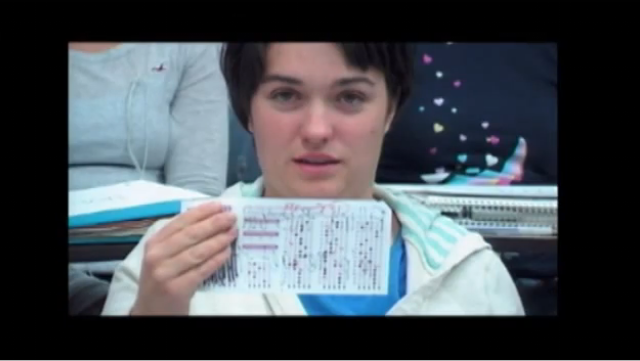
into a world where this is the test for which they prepare:
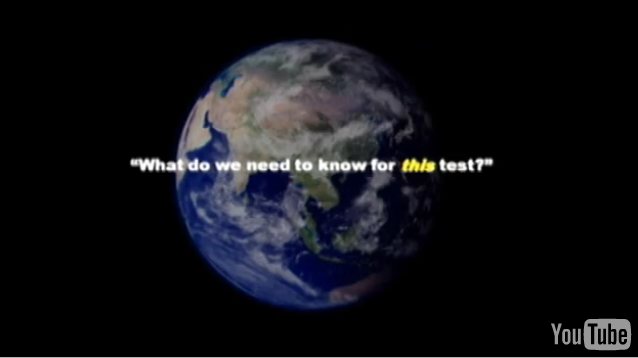
This idea and these two pictures are part of an amazing TED talk at TEDxKC given by Dr. Michael Wesch which you can watch below.
You may remember that Dr. Michael Wesch is the same person who organized the terrific video "A Vision of Students Today" which I have embedded below.
We need to recognize as educators that our duty is to prepare students for the world, whatever that may look like. We can give them as much content knowledge as we like, but if they don’t have the literacies described in Dr. Wesch’s TED talk, they won’t be successful.
I’m posting this to publicly nominate some efforts for the Edublog awards.
Best group blog: Cooperative catalyst
This group blog has really helped me start to transform my practice. The in depth conversations which happen for each post are awesome, and I wish more blogs could discussions like this one rather than a series of rants. I should probably not include this blog as some of my own entries and comments are on it, but the work this group has done has been so valuable, I can’t not nominate it, even if it doesn’t "count". The work I’ve done has been very minor, but the work the collective has done has been amazing and I want to publicly acknowledge their effort.
Most influential blog post: My son is gay
This blog post has generated over 44,000 comments and 3 million hits as of the posting this nomination. The topic, which is not controversial in my opinion (I’m in 100% agreement of the poster), has ignited a firestorm of discussion about an important issue.
Most influential tweet / series of tweets / tweet based discussion: #edchat
As usual #edchat has been a great place for educators to meet online and discuss issues.
Lifetime achievement: Sir Ken Robinson
Sir Ken Robinson has done more to promote the cause of transformation of education than anyone I know. His TED talk has been seen by millions of educators and has sparked conversations all over the world.
I’m not sure where I’ve heard this analogy before but I was reminded of it as I sat on the bus this morning.
Most classrooms are like buses with the teacher driving & students as unwilling passengers, able to see the world through the glass, but not touch it. When we put Internet filters in schools we are placing screens on the windows of the students. When we decrease teacher autonomy, it is like we are fogging up the front windows of the bus, making it hard for the teachers to figure out where they are going. No wonder students are bored and teachers feel like they lack control.
If you are a parent (or a teacher who wants to give a recommendation to an interested parent), and you believe the arguments against homework (see my previous post: 25 Myths of Homework) then you might be asking yourself now, okay so my kid isn’t doing homework: what else should they do instead? These are some suggestions although I highly recommend doing these activities with your child and giving them as much choice in the activity as you can. I also recommend that you approach these suggestions from a perspective of balance rather than a list of "things I must do with my child every night." Claw back the time you spend on homework so you can spend more time with your children or so that children can have more time to self-direct themselves. Obviously there are lots of other things you can do…
- Relax:
Let them relax for at least 30 minutes at home. You want to do the same thing when you get home from work, whether you get the chance to do it or not, so do they. This chance just to relax will probably not look the same for all students.
- Play outside:
Here’s an example of my son learning how to ride a bicycle. Tell me this isn’t more valuable than any homework assignment he could be given.
The research is showing that our children are more obese, at least in North America, and this is at least partially due to the sedentary lifestyle we’ve begun to adopt. The added benefit of playing these games outside with your children is that you will get more exercise too!
- Cook together:
Kids need to learn how to cook somehow. I’m so glad my mom taught me how to cook. I will admit that I forgot this skill when I hit adolescence because it was no longer cool, but when I became a bachelor and now that I am married, this is a very valuable skill.
- Learn about animals:
Whether this means a local farm, a full sized zoo, or even just a walk in the right section of the woods, it is important that our kids learn about animals from first hand experience.

- Be silly:
Kids need play time. Nuff said.
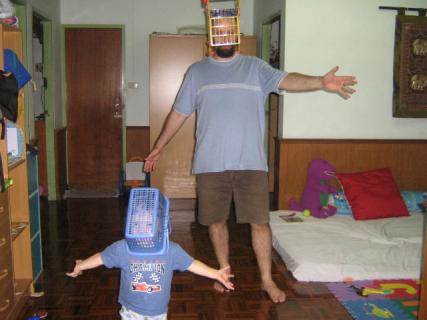
- Go to the beach:
While I’ll admit this isn’t a daily or even weekly activity for us, it is an awesome opportunity for our son to see a completely different part of the world than his everyday experience.

- Make a fort:
This could be something as simple as some pillows from the couch propped together, or when your kids are a bit older they can work with you and build something more permanent. If you build something outside, it’s also a great opportunity for your kid’s friends to come over and help out!
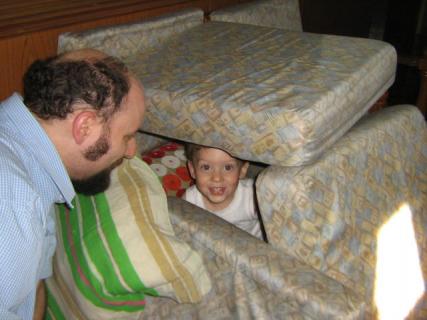
- Learn how to make music:
Music is enriching part of our lives and is unfortunately being cut from many schools as budgets are being slashed during the economic recession. Fortunately you can always learn how to play an instrument, and I would recommend learning an instrument at the same time as your kid.

- Go play at the neighbours:
I’m lucky enough to live in a cooperative housing complex in Vancouver which according to my wife is set up much differently than a co-op in the USA. I don’t know about co-ops elsewhere in the world, but one of the huge benefits of our "community mandated time" is that we know our neighbours in the building. We have five potential babysitters in our building alone and lots of kids with whom our son can play.
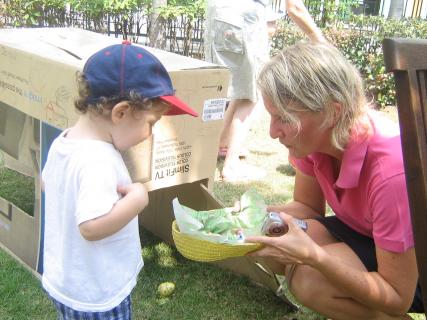
- Play with Grandma or Grandpa:
Our own parents are an excellent source of fun and enjoyment for our kids. They can share some of their ideas, and explain how the world used to be, or they can just have fun.
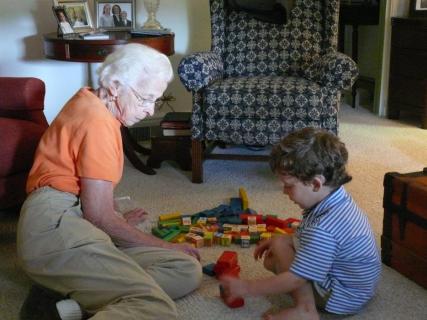

- Read a book together:
According to relatively recent research, less than 50% of all parents read to their children regularly before the age of 5. This hopefully has nothing to do with the amount of homework they are receiving, but does set them up for future success in literacy. It is also a fun thing to do! We find it is a great way to calm our son down for a bit and get him to sit still because he loves stories.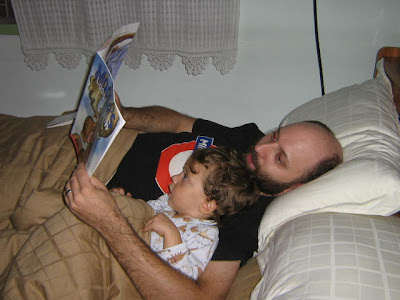
- Go for a walk together:
Just going for a walk in the woods or around the block can be amazing.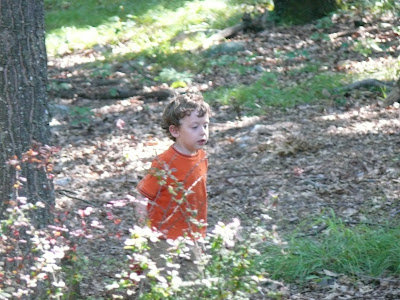
- Work in a garden:
You may not have a backyard or a garden yourself, but most cities and towns do have community gardens. There are also opportunities to volunteer in a garden in most cities.
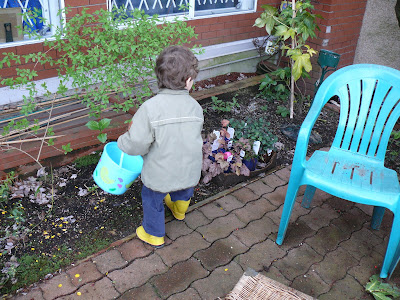
- Do an arts project:
This one I think is obvious and the benefits of creating artwork are awesome. At the very least it can be a really welcome gift for your relatives.
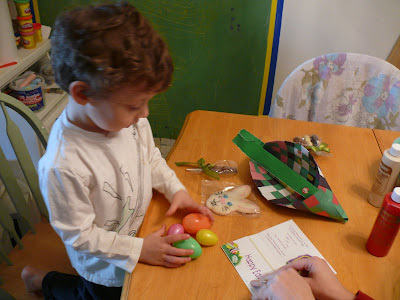
- Do an experiment together:
Science is fun! You can find lots of websites which will give you simple experiments you can do at home. Here’s part of a video I taped of my son and I learning about reasons why things float or sink.
First watch this video to the very end.
Okay, so you get the idea. Assessment for learning assumes that learning is a continuous process, and that using a final average of the student’s work can interfere with the important task of understanding students. An average only shows what could be expected of typical performance of a student and doesn’t show any of the trends in student learning.
In our IB MYP school, we use assessment for learning. Each time we are asked to produce a report card, we take a snapshot of what we think the student should be capable of doing by examining their current portfolio of work, and we record that snapshot as the grade. We don’t average grades. If a student starts out the beginning of the year and does nothing, but then by the end of the year they are producing masterpieces, then we assume that they can produce masterpieces. We all know the content at the end of the year is generally more difficult than the beginning of the year, but we also know that kids change during a year.
Let’s look at a more extreme analogy. Suppose you are trying to become a famous painter. You try and create a masterpiece, but over and over again your work just isn’t there. You keep improving a little bit each time because you are practicing, but most of what you produce is really not that good. One day you have a break-through and you paint a masterpiece. Your work goes viral and you make millions of dollars in prints. Are you successful? Should we consider a kid who produces an awesome piece of work to be successful? What if it is their final exam?
